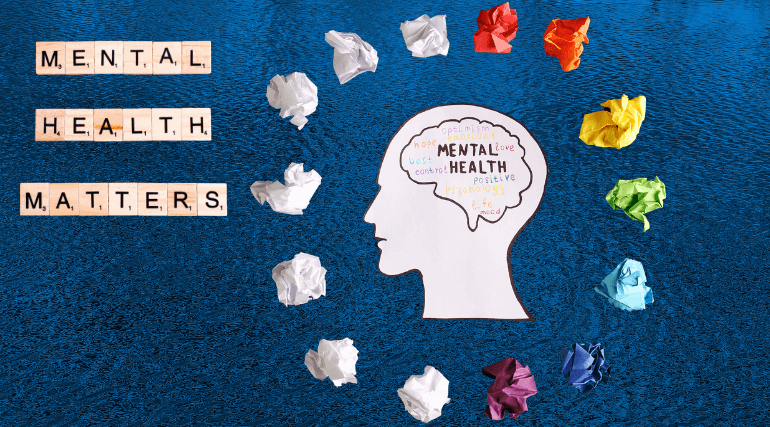Mental Health Tips For An International Student
From the outside, travel blogs and the Instagram community have created a narrative that people that live internationally for a long stretch of time are sociable with a positive mindset. This is just not true, as we’re sure many of those blogs will readily confess. Traveling and studying abroad alters every area of a person's life, and this has an influence on their mental health, whether for the better or for the worse (or both).
It takes guts to study abroad. It necessitates a young person's willingness to take risks. The truth of studying abroad is that it forces young adults out of their comfort zone; they are separated from their childhood buddies, living in a different nation than their family, and, in many cases, immersed in a whole new way of life and perception of the world. This is a gradual process.
Those additional responsibilities are adding to what is already a stressful time in the life of a young adult. While the university is a productive and joyful experience for students, sadness and loneliness are frequent during a time when they will meet new people, slog through mountains of schoolwork, and live away from home for the first time in their life.
Long before the pandemic exposed the flaws in higher education, foresighted university officials began to recognize the importance of addressing the mental health of international students. International students have long been susceptible due to a variety of stresses including language challenges, perceived prejudice, acculturation stress, and untreated mental health disorders.
The need to adjust to entirely new locations, habits, and stressful events might bring underlying mental health problems to the surface. Thankfully, public perceptions of mental illness are shifting. While research on mental disorders is still restricted in comparison to physical ailments, there is now more information and resources available than ever before to assist persons suffering from mental illnesses.
Common mental health issues
For students studying abroad, culture shock and homesickness are typical causes of depression and anxiety. Mental illness has no bounds. Mental health can influence foreign students, whether or not they have core issues. The following are the most frequent mental health disorders among overseas students:
Major depressive disorder (MDD) is the most common mental condition, with symptoms that often appear in adolescence. It is marked by mood dysregulation, which manifests as a persistent sorrow or lack of interest, as well as unfavorable changes in hunger, sleep, attention, or energy, as well as agitation, sluggish cognition and movement, or suicidal thoughts.
Anxiety is defined by excessive anxiety and, in some cases, bodily symptoms (e.g., heart racing, gastrointestinal issues, sweating). This might affect an international student's capacity to meet new people and take on new tasks.
A person with bipolar disorder will have substantial depressive periods as well as manic mood swings. Mania is defined by a heightened, "high," or hyper mood that differs from one's typical personality. It can lead to rash decisions, which might have harmful repercussions.
Educators can make a difference
Educators are in a unique position to make a good influence on their students' mental health on a personal level. Educators have the unique opportunity to work directly with their pupils, developing a professional yet personal bond. A student may not be ready to admit he or she has a mental health problem, or may not even be aware that one exists. Educators should be aware of several essential mental health behaviors to watch for, such as major depressive disorder, bipolar disorder, depression, and anxiety.
Educators should review their school's policies on how to deal with mental health concerns on school premises, but that initial contact with a teacher can be the first and most important step in identifying that a problem exists. Teachers have a unique position of influence and play a significant role in the lives of students. The actions taken by an educator to assist a student in recognizing and dealing with a mental health condition can have a significant influence on their future academic achievement.
A friendly voice
Travel insurance and the people who sell it are usually only thought of after a physical injury or accident. Agents, on the other hand, play a crucial role in interacting with international students, letting them know that aid is available if they need it. Insurance providers are there to assist you. Many provide coverage for pre-existing mental health conditions, and some even provide support services for individuals who may be at risk for mental illness.
Tips to improve mental health for students
Students' mental health is a difficult topic, especially now that the globe is fighting COVID-19. It's also a crucial problem for educators, who are typically the first line of defense for their students. Education specialists recognize the impact of a student's mental health on learning and achievement, and they recognize that there is a lot that can be done to help children who are dealing with mental health issues. As a result, we've developed a list of vital and required advice for student's mental health:
A healthy diet is always the #1 step.
The first and most important pro-tip for students who want to enhance their mental health is to develop the habit of consuming the correct foods and properly replenishing their bodies. More studies relating diet to mental health are released every year. Poor diets and unhealthy eating habits may certainly harm your physical health, which can subsequently harm your mental health, but terrible food can also make you feel worse. Eating a well-balanced, nutritious diet rich in fats, fiber, and minerals can help you manage stress and anxiety, improve your sleep, boost your memory, as well as make you feel better overall.
The right amount of sleep is the key.
Another great strategy for students to boost their mental health is to make sure they get at least 8 hours of sleep each night. Sleep has been related to a wide range of physical and mental health issues. While some psychological or mental ailments can cause sleep problems, a lack of sleep can exacerbate pre-existing conditions such as melancholy, stress, and anxiety. Getting enough sleep every night and going to bed early or at a reasonable hour is a great way to live a healthy and happy life. Students' mental health might be affected by their sleeping habits.
Do what piques your interest!
What do you enjoy doing? Is it reading, drawing, gardening, or dancing that you like the most? The options are many, but it's critical for your mental health that you spend some time doing something you actually like. Every day, whether for 5 minutes or longer, having a little fun may help you relax and concentrate your attention and concentration on something that brings you great joy. There are other things that might make you happy that you may not expect or associate with having fun, such as donating old clothes to charity or volunteering for a non-profit organization.
Give your mobiles some rest.
Another pro-tip for students to promote mental health is to relax their bodies, particularly their eyes. You may not consider yourself hooked to your phone, social media, or other smart gadgets, but limiting your screen time and technology usage is becoming increasingly challenging. The usage of social media and other kinds of media in excess and for a lengthy period of time may have negative implications. Even an excessive amount of news might be harmful to your mental health. There's no need to go cold turkey and cut it out of your life completely. Limiting yourself, on the other hand, might be a smart idea.
It’s okay to ask for help.
Both kids and youth must realize and understand that seeking therapy for psychological health and well-being has no dire effects. It is the appropriate and healthy thing to ask for help when you require it. Unfortunately, in our culture, there is still a stigma attached to mental health and seeking treatment to enhance mental health for kids and youth. This is beginning to change, though. People are beginning to understand not just how prevalent mental health issues are, but also how important and normal it is to seek care. You are not required to accomplish this alone.












